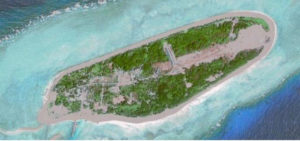The ‘island’ designation is valuable. Taiwan insists that Itu Aba or Taiping Island (Taipingdao 太平岛) is an island (dao 岛 means ‘island’) because it wants the rights to fish, oil, gas, and any other resources in a 200-nautical-mile Exclusive Economic Zone (EEZ) around the rock. China makes the same claim for Taiping Island. And with the prospect of reunification with Taiwan in China’s vision of its future, Beijing has not objected to Taiwan building infrastructure on the rock, including an airstrip, hospital, post office, and services for the 200 people who reside there on a temporary rotating basis. (For the Taiwan perspective, see Information Window ‘Taiwan and the South China Sea’) The tribunal ruling gives the Philippines exclusive legal rights to, for example, extraction of hydrocarbons on the Reed Bank, which falls within the Nine-Dash Line, and partly within 200 nautical miles of Taiping Island.
The precedent-setting designation of Taiping Island as a ‘rock’ has implications for maritime law all around the world. It may affect claims including Japan’s over the uninhabited atoll Okinotiorishima in the Philippine Sea and US and French claims in the Pacific.
China cites the tribunal’s decision that Taiping Island is a rock as evidence of the flawed nature of the entire decision. The judges relied on historical evidence and did not visit Taiping Island themselves, believing that the current state of the island was unlikely to reflect its natural capacity for sustaining human habitation. They noted also that the People’s Republic had strongly objected to such a visit through a letter from the Chinese Ambassador to the Netherlands, addressed to the judges, on 6 February 2015.



